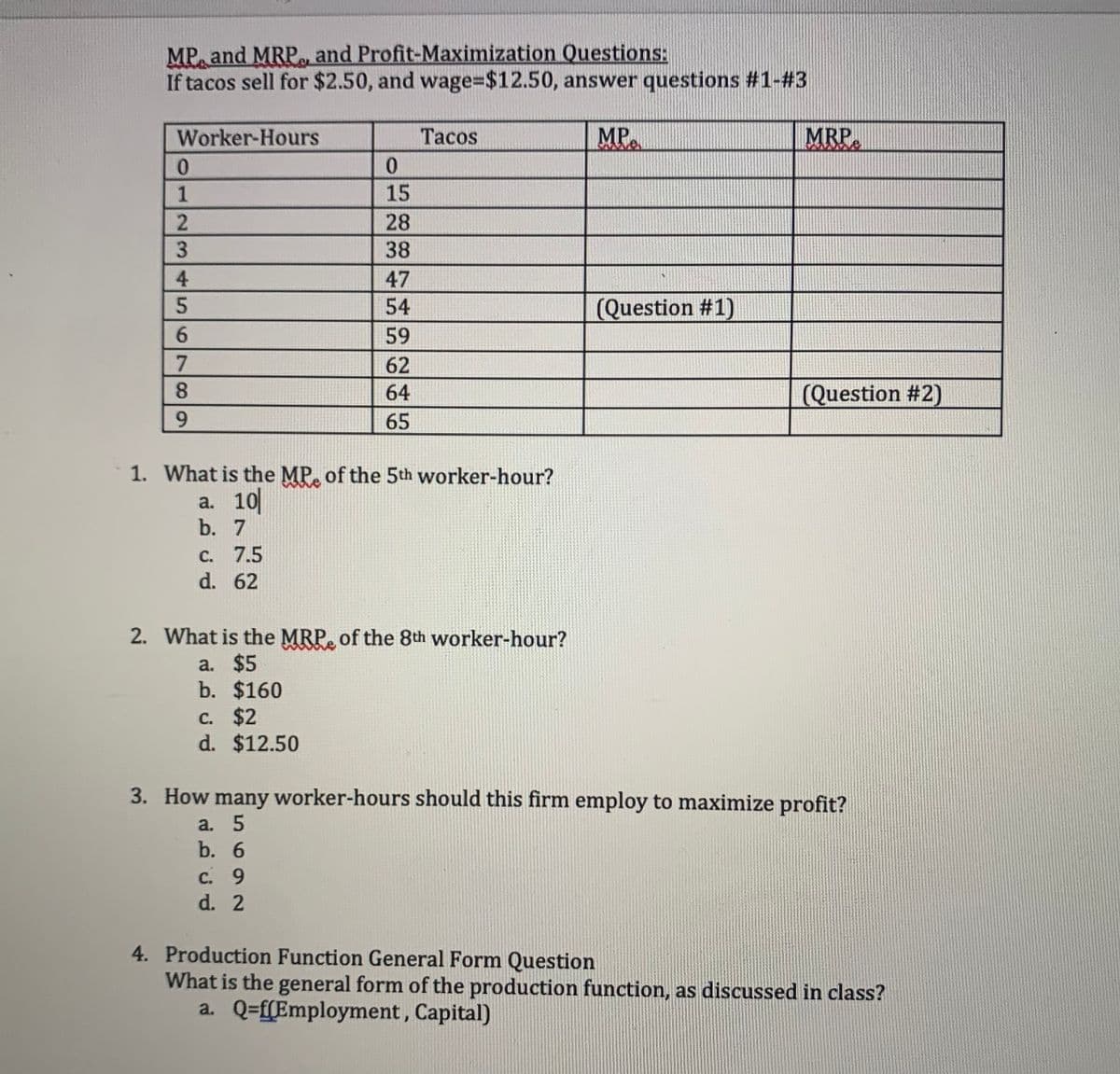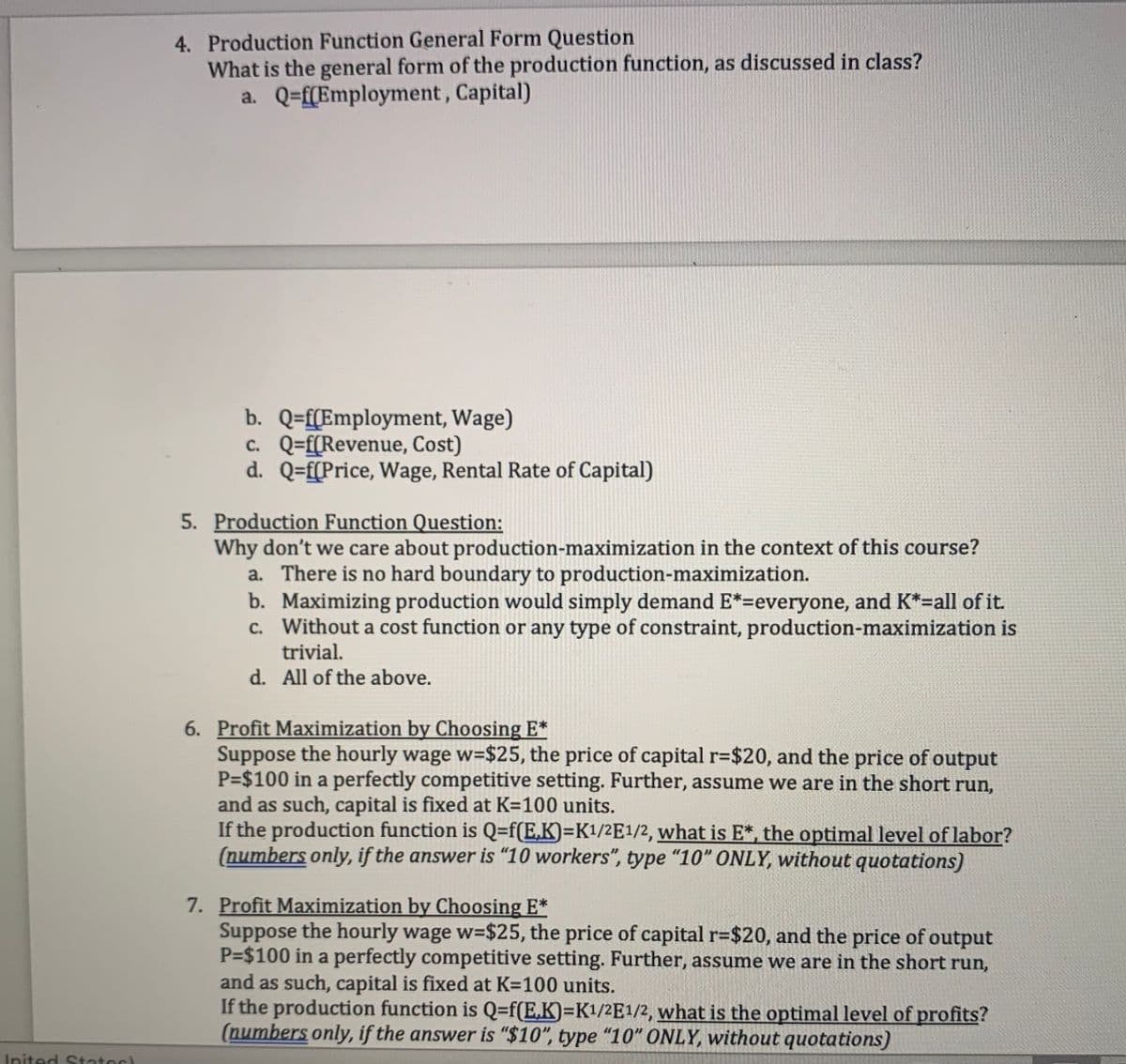5. Production Function Question: Why don't we care about production-maximization in the context of this course? a. There is no hard boundary to production-maximization. b. Maximizing production would simply demand E*=everyone, and K*=all of it. c. Without a cost function or any type of constraint, production-maximization is trivial. d. All of the above. 6. Profit Maximization by Choosing E* Suppose the hourly wage w=$25, the price of capital r=$20, and the price of output P=$100 in a perfectly competitive setting. Further, assume we are in the short run, and as such, capital is fixed at K=100 units. If the production function is Q=f(EK)=K1/2E1/2, what is E*, the optimal level of labor? (numbers only, if the answer is "10 workers", type "10" ONLY, without quotations) 7. Profit Maximization by Choosing E* Suppose the hourly wage w=$25, the price of capital r=$20, and the price of output P=$100 in a perfectly competitive setting. Further, assume we are in the short run, and as such, capital is fixed at K=100 units. If the production function is Q=f(E.K)=K1/2E1/2, what is the optimal level of profits? (numbers only, if the answer is "$10", type "10" ONLY, without quotations)
5. Production Function Question: Why don't we care about production-maximization in the context of this course? a. There is no hard boundary to production-maximization. b. Maximizing production would simply demand E*=everyone, and K*=all of it. c. Without a cost function or any type of constraint, production-maximization is trivial. d. All of the above. 6. Profit Maximization by Choosing E* Suppose the hourly wage w=$25, the price of capital r=$20, and the price of output P=$100 in a perfectly competitive setting. Further, assume we are in the short run, and as such, capital is fixed at K=100 units. If the production function is Q=f(EK)=K1/2E1/2, what is E*, the optimal level of labor? (numbers only, if the answer is "10 workers", type "10" ONLY, without quotations) 7. Profit Maximization by Choosing E* Suppose the hourly wage w=$25, the price of capital r=$20, and the price of output P=$100 in a perfectly competitive setting. Further, assume we are in the short run, and as such, capital is fixed at K=100 units. If the production function is Q=f(E.K)=K1/2E1/2, what is the optimal level of profits? (numbers only, if the answer is "$10", type "10" ONLY, without quotations)
Economics Today and Tomorrow, Student Edition
1st Edition
ISBN:9780078747663
Author:McGraw-Hill
Publisher:McGraw-Hill
Chapter12: The American Labor Force
Section12.1: Amercians At Work
Problem 1R
Related questions
Question
100%
Please help with questions 5-7
thank you

Transcribed Image Text:MP and MRP, and Profit-Maximization Questions:
If tacos sell for $2.50, and wage=$12.50, answer questions #1-#3
Worker-Hours
0
1
23456789
c. 7.5
d. 62
0
15
28
38
47
54
59
62
64
65
1. What is the MP of the 5th worker-hour?
a. 10
b. 7
c. $2
d. $12.50
Tacos
2. What is the MRP of the 8th worker-hour?
a. $5
b. $160
MP
(Question #1)
MRP
(Question #2)
3. How many worker-hours should this firm employ to maximize profit?
a. 5
b. 6
c. 9
d. 2
4. Production Function General Form Question
What is the general form of the production function, as discussed in class?
a. Q=f(Employment, Capital)

Transcribed Image Text:Inited States
4. Production Function General Form Question
What is the general form of the production function, as discussed in class?
a. Q=f(Employment, Capital)
b. Q=f(Employment, Wage)
c. Q=f(Revenue, Cost)
d. Q=f(Price, Wage, Rental Rate of Capital)
5. Production Function Question:
Why don't we care about production-maximization in the context of this course?
a. There is no hard boundary to production-maximization.
b. Maximizing production would simply demand E*=everyone, and K*=all of it.
c. Without a cost function or any type of constraint, production-maximization is
trivial.
All of the above.
d.
6. Profit Maximization by Choosing E*
Suppose the hourly wage w=$25, the price of capital r=$20, and the price of output
P=$100 in a perfectly competitive setting. Further, assume we are in the short run,
and as such, capital is fixed at K=100 units.
If the production function is Q=f(E,K)=K¹/2E1/2, what is E*, the optimal level of labor?
(numbers only, if the answer is "10 workers", type "10" ONLY, without quotations)
7. Profit Maximization by Choosing E*
Suppose the hourly wage w=$25, the price of capital r=$20, and the price of output
P=$100 in a perfectly competitive setting. Further, assume we are in the short run,
and as such, capital is fixed at K=100 units.
If the production function is Q=f(E.K)=K1/2E1/2, what is the optimal level of profits?
(numbers only, if the answer is "$10", type "10" ONLY, without quotations)
Expert Solution
This question has been solved!
Explore an expertly crafted, step-by-step solution for a thorough understanding of key concepts.
Step by step
Solved in 2 steps with 2 images

Knowledge Booster
Learn more about
Need a deep-dive on the concept behind this application? Look no further. Learn more about this topic, economics and related others by exploring similar questions and additional content below.Recommended textbooks for you

Economics Today and Tomorrow, Student Edition
Economics
ISBN:
9780078747663
Author:
McGraw-Hill
Publisher:
Glencoe/McGraw-Hill School Pub Co

Microeconomics: Private and Public Choice (MindTa…
Economics
ISBN:
9781305506893
Author:
James D. Gwartney, Richard L. Stroup, Russell S. Sobel, David A. Macpherson
Publisher:
Cengage Learning

Economics: Private and Public Choice (MindTap Cou…
Economics
ISBN:
9781305506725
Author:
James D. Gwartney, Richard L. Stroup, Russell S. Sobel, David A. Macpherson
Publisher:
Cengage Learning

Economics Today and Tomorrow, Student Edition
Economics
ISBN:
9780078747663
Author:
McGraw-Hill
Publisher:
Glencoe/McGraw-Hill School Pub Co

Microeconomics: Private and Public Choice (MindTa…
Economics
ISBN:
9781305506893
Author:
James D. Gwartney, Richard L. Stroup, Russell S. Sobel, David A. Macpherson
Publisher:
Cengage Learning

Economics: Private and Public Choice (MindTap Cou…
Economics
ISBN:
9781305506725
Author:
James D. Gwartney, Richard L. Stroup, Russell S. Sobel, David A. Macpherson
Publisher:
Cengage Learning


